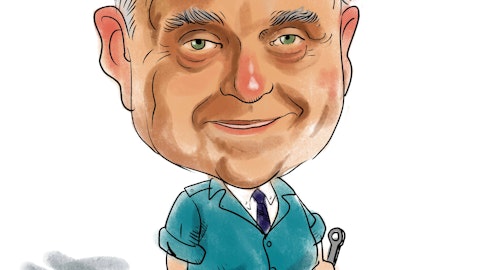Lee Cooperman: All right. Talk later. Thank you.
Glen Messina: Yes, sir.
Operator: Our next question comes from Kyle Joseph with Jefferies.
Kyle Joseph: Good morning guys. Thanks for taking my questions. Just on that 9% ROE assuming origination stabilized, where are we in the market, obviously rates of impacted demand supplies been chasing demand down. Is it just a function of if we get rate stability at this point, has there been enough demand removed from the market that that would be enough to lead to stabilization? Just in your opinion? Kind of a crystal ball question, I apologize.
Glen Messina: Yes. Look, as we think about the originations market, I think a couple of things have to happen. Number one, relatively stable rate environment, we’ve not seen anything like that. So, we’ve seen rates drop materially and then come back up even during the course of the first quarter so far in 2023, probably close to a 50 to 70 basis point movement in the 30 year fixed rate mortgage rate. So rate stability is number one. And look, I still think there’s excess capacity in the origination space in a material way, I do think capacity’s got to come out of the system. And right now we are seeing people, frankly, from our perspective, probably approaching the market with pricing levels to fill operational capacity versus taking capacity out.
Sean O’Neil: Kyle, it’s Sean, it’s a lagging indicator, but if you look at a lot of our public peers that have already announced many companies are struggling to generate what I’d call positive adjusted pre-tax income in the origination space. That to me is at least a lagging indicator that there’s still excess capacity in the market. We see some of the other big originator pure plays announced in the coming week, and that’ll continue to inform that.
Kyle Joseph: Yep. Got it. Helpful. And then just on that what are your expectations for reverse originations in 2023 versus 2022? Obviously that mark is not immune to rate movements, but probably has impacted marginally differently than the forward side, but just kind of how you’re thinking about originations for that product?
Glen Messina: Yes. Kyle, look, there’s no equivalent, Fannie Mae, Freddie Mac, MBA forecast for the reverse market. So, look our assumption right now is, the market is going to shrink probably at least on a comparable basis to the forward market. Reverse originations are largely influenced by short-term interest rates. And with short-term rates going from sub 1% to the 5-ish percent level in over a two year period, that’ll take a €“ it really limits the amount of equity a borrower can take out of their home in the form of a reverse mortgage. So even though, home values, even if they’re stable, the amount of cash out you can get has come down and that takes some €“ put some buyers and some reverse mortgage customers on the sidelines. So we do expect to see a fairly sizable reduction comparable to what we see in the forward side impact reverse as well until short-term rates can come back to a more reasonable level.
Kyle Joseph: Got it. Very helpful. Thanks for answering my questions.
Glen Messina: Yes, sir.
Operator: Our next question comes from Matthew Howlett with B. Riley.
Matthew Howlett: Hey, thanks for taking my question. Good morning. Glen, just getting back to the MSR mark, I mean, look, I appreciate the conservatism you outlined, the yields, the , the yield discount rate moving higher. We’ve seen obviously a big moving rate since year-end. My question to you is, how willing are you to sell some more whole MSRs, if there is a bid out there and delever, just blew away from sort of this mark-to-market volatility, paid on your lines to focus on sub-servicing?
Glen Messina: Yes, so look, we are in the market pretty much on a quarterly basis, both buying and selling MSRs. As you know, we work with MSR investment partners to fund a portion of our origination. So we evaluate on a fairly continuous basis, does it makes more sense to hold MSRs versus sell MSRs. As you know, we also have a fair amount of corporate debt on our balance sheet about $500 million of corporate debt between the Oaktree notes and the PHH OpCo notes, those notes are not prepayable without penalty. So, if we’re thinking about selling MSRs in addition to paying down the variable debt, the variable interest rate debt, the secured MSR financing that we have, you’d want to use the proceeds to pay down some of the corporate leverage as well too.
And unfortunately, right now where we are with our corporate debt, the prepayment penalties would be fairly high unless we tender in the open market, which is something we did during 2022. Look, we’ll €“ in small bite size pieces, it is feasible at the right returns and the right economics to take some value off the table and sell some MSRs and redeploy the capital in the business elsewhere and arguably to reduce that. Sean, any thoughts?
Sean O’Neil: Yes, Matt, the one thing I’d add is, there’s a nuance as we have engaged in different sales transactions over the last two quarters, so in Q3 and Q4, we pursued some excess servicing strip transactions, and you’ll see the details of that broken out in our K as that requires slightly different counting. But the interesting thing about an ESS transaction is you are retaining the sub-servicing rights. So to your original question, as Glen pointed out, we actively are in the market and are looking for opportunities to €“ we view it as managing our portfolio in a dynamic fashion where we can sell an existing MSR at a good return and then in turn as we originate some higher coupon MSRs will replace that and slowly increase the whack of the book.
But the ESS transactions allow us to retain the scale on the servicing side and still generate cash. So it’s kind of an interesting transaction for us in that respect. And we did I believe at least three of those in the last two quarters.
Matthew Howlett: And that’s where I’m going with it. I mean, to me, you’ve been successful buying back debt. I think the senior debt trades below 90 and obviously that’s accretive to continue buying that back and I don’t know, what does it get for shareholders being the most conservative guy out there with MSR marks is great, but I don’t know what it get shareholders, your stock already trades at a huge discount to reported book. If the book is understated, I’m not sure what that does. And to me, it would make a lot of sense. Is there an update on MSR has moved up in value with the 4% yield since year-end. Could you give us a little snapshot on what’s happened to MSR marks post quarter-end?




